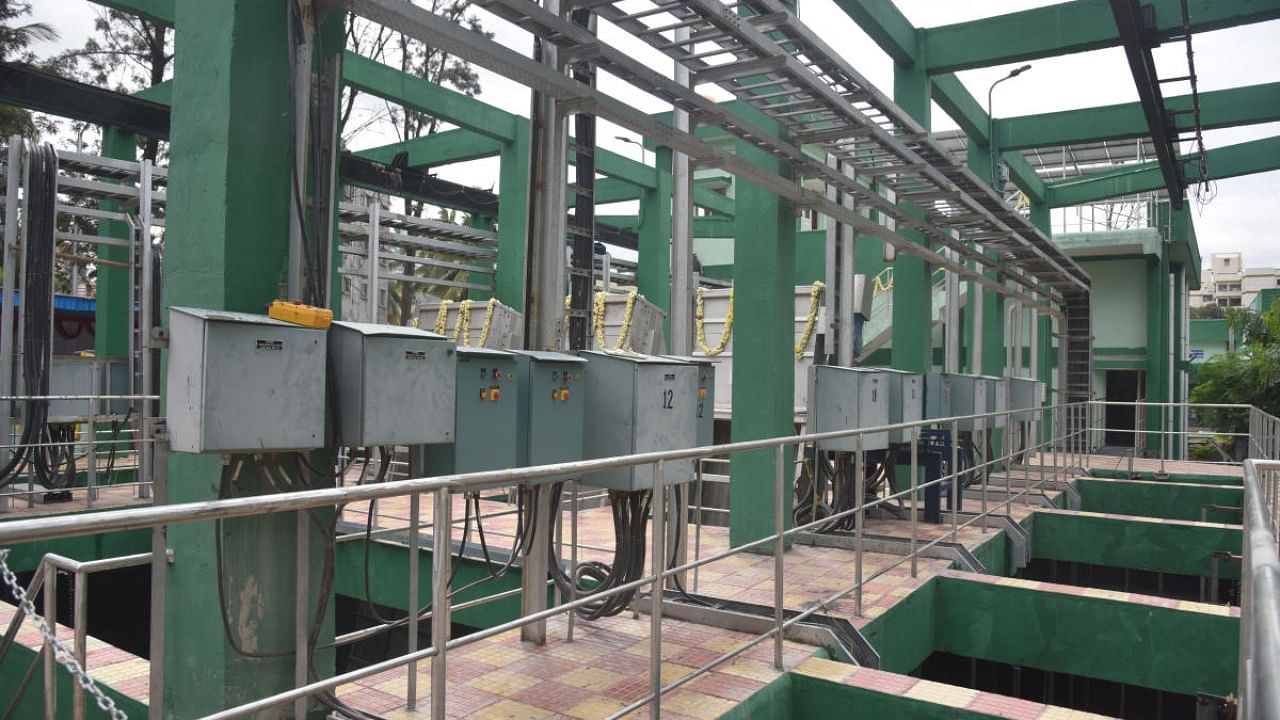
The BWSSB’s dream of treating all of the city’s sewage seems good on paper. One critical look at the existing quality of treated water reveals the loopholes that can make the mission meaningless.
Take for example the plant inside Lalbagh capable of treating 1.5 MLD of sewage. According to the BWSSB’s website and many requests for Consent for Operation (CFO) examined by DH, this is a tertiary treatment plant.
Tertiary treatment is the advanced treatment process that produces high—quality water. It includes removal of nutrients such as phosphorus and nitrogen and practically all suspended and organic matter from waste water, making it safer for human ingestion.
However, documents also showed that many quality checks done by the KSPCB here since 2017 have shown the treated water to be of substandard level. One main issue is the presence of faecal coliform, way beyond acceptable levels—12,000 and 490 in two cases, while the acceptable limit for D category use (wildlife and fisheries) is less than 100. In a tertiary treatment plant, it should be ideally zero.
KSPCB officials privately admit that no sewage treatment plant in Bengaluru is capable of producing potable water, though BWSSB produces 90 MLD of it.
Documents show that despite being served notices by KSPCB, the situation in Lalbagh tertiary treatment plant did not improve. Yet, the KSPCB extended the consent for it to operate in June 2022.
“Shutting down STPs is just a matter of one order," says a source at KSPCB, explaining the complications of doing so. “What’s the alternative? We know BWSSB has been lax in maintaining the quality of treated water. But if we shut it down, whatever that’s treated will also remain untreated. That will be a bigger mess,” says the source.
In effect, if the BWSSB does not take enough care to ensure quality, no other government body including the KSPCB can do anything to fix the issue.
BWSSB engineer in charge of waste water Gangadhar told DH that the issue in Lalbagh STP has been fixed now, and water is being used in irrigating the garden and discharged into the lake.
The real-time water quality monitoring system on the BWSSB website shows some data for some of the STPs. Data for eight of the STPs are absent. More importantly, faecal coliform data is totally absent from the dashboard.
Bengaluru has more than 3,000 apartments that have STPs. KSPCB sources say the staff shortage at the board made sure they could not inspect private apartments often. This means that apartments are completely on their own to ensure the quality of treated water in their STPs, with no serious oversight.
Peoplespeak
Vikram Shetty, entrepreneur
BWSSB has been directing treated water to fill up lakes, which in turn pollutes the existing rainwater in the lake. It will also affect the groundwater because the treated water will have impurities like chemicals. The treated water should be ideally used for construction works. When KSPCB and BWSSB want treated water from the apartments to be utilised to maintain their green spaces along with individual apartment sanitary needs, why not have a similar arrangement for individual houses?
Vinay S Jakati, Founder, Prayas Trust
It is possible to achieve a 100% target by 2025 if there is no corruption in the process. The treated water must be used in all parks, construction activities, water washing units for bikes and cards, bus depots etc. The treatment units should be decentralised and they should be available at an affordable price. They should also have a tanker facility.
Elangovan Kulandaivelu, Lake Volunteer, Whitefield Rising
It is not enough to just set up STP capacity, but the treatment needs to be effective. During a visit to an STP by the NGT-appointed committee, they noticed that the real-time sensors were not powered on. BWSSB chairperson being on the KSPCB governing board is being pointed out as a conflict of interest by experts. Treated water can be reused for flushing, landscaping, agriculture, and even for drinking like some communities have done. A policy that mandates all industries including construction to use treated water should be enforced.
Bindu Jayaram, Former director of a water start-up
Bengaluru is growing at an enormous rate. By the time the current service jurisdictions are covered (in terms of wastewater treatment), the city would have grown by 5-10%. Currently, a lot of treated water is let into lakes. BWSSB could mandate all malls, govt departments and IT companies in Bengaluru to use treated water. BWSSB could also upgrade the technology used in treating water and create awareness. The onus of treating waste water should not be entirely on BWSSB alone. Every smaller apartment and individual house should do their part in treating the wastewater they generate.